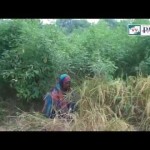11th March 2015 | Ranchi, Jharkhand | Priyasheela Besra
In November 2014 Razia*, who had been working as a domestic helper in Ranchi, Jharkhand, ran away from her employers. In the four months that she worked there, her male employer had repeatedly raped her.
Community Correspondent Priyasheela Besra reported her story with a demand that the accused be tried under the Protection of Children from Sexual Offences Act 2012 (POCSO). For the past two years, especially through 2014, there has been a public outrage against child sexual abuse in India with cases from across India coming out of the woodwork. Our Correspondents in Jharkhand alone have reported on several such instances. Human Rights Watch finds that since POCSO was enacted in 2012, there has been a steady rise in the number of cases being reported— an increase of 45 per cent according to the National Crime Records Bureau of India.
“We can’t afford to ignore these issues anymore and in fact as a society we need to seriously introspect and ask ourselves what we are going to do about this,” says Priyasheela. It becomes increasingly important to look at the circumstances under which young children, both girls and boys, are made vulnerable to such attacks.
Razia’s story exemplifies what tens of thousands of children face across the country. Originally a resident of Isaipatti in Darbhanga in the neighbouring state of Bihar, Razia found her way to Ranchi in search for work. It is estimated that women make up about 70 per cent of all of India’s internal migrants. Further, states like Bihar and Uttar Pradesh, which have large rural populations, are the largest ‘migrant-sending’ states to urban areas. While the country has seen high rates of economic growth, this has not necessarily translated into gainful employment for many of India’s poorest communities.
For a young girl like Razia, a bustling city like Ranchi with its umpteen employment opportunities and chances to fulfil dreams is also a minefield of challenges. In the absence of even the most basic food and shelter, she is forced to live on the streets, at railway stations, at roadside restaurants. She is left exposed to all kinds of vulnerabilities, sexual abuse being but one.
A fact-finding mission carried out in Jharkhand by the National Commission for the Protection of Child Rights details the harrowing conditions under which many young children are forced to work in in metros like Delhi and Mumbai. Almost all the children reported that they had been physically and verbally abused by their employers; their ‘uncles and aunties’. When the situation got out of hand for Razia she ran away from the house and was fortunate enough to end up in the care of Ms Aloka a social worker in Ranchi.
It was Aloka who facilitated the process of Razia being able to file a First Information Report at the police station. The accused was immediately arrested after the report was filed. Police prosecution is usually a massive hurdle for survivors of such abuse as the system is infamous for causing more trauma in the process of bringing justice. It is heartening to know then that in Razia’s case the proceedings started on the right note. We now need you to keep the pressure mounted on the authorities and ensure that the accused is booked under the POCSO Act.
*The survivor’s name has been changed to protect her identity. Since this video was made, there has been no update on where Razia is and how she has settled back into Darbhanga. We will keep you updated on this.
Fighting for Change: The Story of Bihar-Based Journalist Amir Abbas
Inspiration can come from many sources, but one of the most powerful is seeing someone walk the path before you. Our Community Correspondent, Syed Amir Abbas found his inspiration in Stalin K., the founding director of Video Volunteers. “I met Stalin at VV’s national meet in 2017 and I...
The torch bearer of rights for marginalized tribals of Odisha
If you ask Video Volunteers’ Community Correspondent Bideshini Patel to rate her childhood on a scale of 1-10, she would probably give it a negative marking due to the neglect and abuse she faced. But if you ask her to evaluate her professional life as an impactful journalist, resolving basic...

